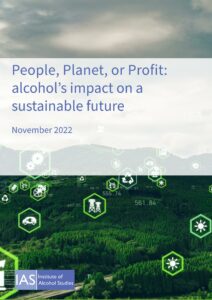View this report

Alcohol has rarely been considered from a sustainability angle. Between 2021 and 2022, we ran a four-part webinar series on ‘Alcohol and Sustainability’, with expert speakers from academia, think tanks, and journalism presenting on interrelated topics. This report is inspired by these presentations. It includes IAS and speaker recommendations for how civil society and policymakers should consider sustainability when formulating alcohol control policies.
To watch the presentations, please visit our YouTube account here.
Sustainability and environmental issues regarding alcohol have been overlooked by drinkers and governments
Alcohol is a discretionary, non-essential product that causes over 200 health conditions. The harm that alcohol causes to health, society and the economy is already well-known. However, the damage caused to the environment, sustainable development, and human rights across the lifecycle of alcoholic products has received little attention so far. Much of this harm is invisible to drinkers, and is also not taken into account by governments formulating alcohol policy.
Current alcohol production, consumption, and corporate social responsibility activities are all barriers to sustainable development
The production and consumption of alcohol adversely impacts 13 of the 17 Sustainable Development Goals (SDGs). It can push people into poverty or keep them there, uses up water for crop growth in areas where people do not have enough to drink, contributes to human rights abuses across the globe, and exacerbates the climate crisis.
Despite these negative impacts, many alcohol companies aim to position themselves as engines of development and align their corporate social responsibility (CSR) activities with the SDGs and other development causes. They do so as a core part of their marketing strategy to increase product sales – putting profit above the health of people and the planet. In addition, some companies use this CSR activity as a lobbying tactic to delay or prevent the implementation of proven, effective alcohol control policies.
Environmental research highlights damage from the release of greenhouse gas emissions during production, transportation and refrigeration, to crop growth damaging animal populations and displacing essential food production. Consumers should be made aware of this to make informed decisions about their consumption of products that damage the environment.
Some alcohol multinationals have been and still are involved in human rights abuses, especially in the Global South. This includes wages below the poverty line, inadequate protection from health and safety risks, and vulnerability to exploitation and forced labour. Higher income countries like the UK continue to import significant quantities of alcohol from such regions. One example is South Africa’s Western Cape, which still has substandard working conditions.
Co-benefits exist between sustainability and alcohol control policies
The alcohol industry and alcohol consumption both impede progress towards a more sustainable future. Approaches to alcohol policy globally must address the wider harms of alcohol production and consumption, and its impact on the SDGs, environment and human rights. Evidence-based and cost-effective alcohol control policies can work to both reduce harm from alcohol and tackle alcohol’s negative impact on the environment, development and human rights.
It is crucial that global alcohol policies are developed by worldwide collective action to prevent the alcohol industry from simply shifting production and marketing of products from countries with increasingly stringent and effective policies, to countries with less developed policies. This has already occurred in the environmental space, with multinational companies moving polluting factories to countries with more lax regulations. The development of a Framework Convention on Alcohol Control would go some way to tackling the issue of cross-border offloading of harm, whether in relation to environmental, marketing, or economic policies.
Alcohol producers can and should improve their business practices to move towards more sustainable practices. However, a reduction in production and consumption of alcohol could benefit the twin goals of population health and sustainable development.
View this report
